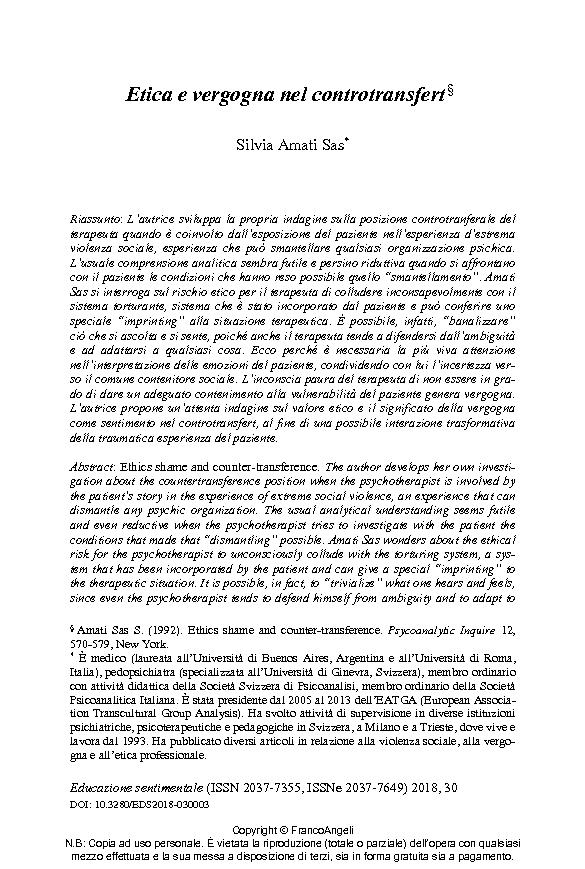Etica e vergogna nel controtransfert
9-16 p.
L'autrice sviluppa la propria indagine sulla posizione controtranferale del terapeuta quando è coinvolto dall'esposizione del paziente nell'esperienza d'estrema violenza sociale, esperienza che può smantellare qualsiasi organizzazione psichica. L'usuale comprensione analitica sembra futile e persino riduttiva quando si affrontano con il paziente le condizioni che hanno reso possibile quello "smantellamento". Amati Sas si interroga sul rischio etico per il terapeuta di colludere inconsapevolmente con il sistema torturante, sistema che è stato incorporato dal paziente e può conferire uno speciale "imprinting" alla situazione terapeutica. È possibile, infatti, "banalizzare" ciò che si ascolta e si sente, poiché anche il terapeuta tende a difendersi dall'ambiguità e ad adattarsi a qualsiasi cosa. Ecco perché è necessaria la più viva attenzione nell'interpretazione delle emozioni del paziente, condividendo con lui l'incertezza verso il comune contenitore sociale.
L'inconscia paura del terapeuta di non essere in grado di dare un adeguato contenimento alla vulnerabilità del paziente genera vergogna. L'autrice propone un'attenta indagine sul valore etico e il significato della vergogna come sentimento nel controtransfert, al fine di una possibile interazione trasformativa della traumatica esperienza del paziente. [Testo dell'editore].
The author develops her own investi-gation about the countertransference position when the psychotherapist is involved by the patient's story in the experience of extreme social violence, an experience that can dismantle any psychic organization. The usual analytical understanding seems futile and even reductive when the psychotherapist tries to investigate with the patient the conditions that made that "dismantling" possible. Amati Sas wonders about the ethical risk for the psychotherapist to unconsciously collude with the torturing system, a system that has been incorporated by the patient and can give a special "imprinting" to the therapeutic situation. It is possible, in fact, to "trivialize" what one hears and feels, since even the psychotherapist tends to defend himself from ambiguity and to adapt to anything. For this, the most acute attention is needed in the interpretation of the patient's emotions, sharing with him the uncertainty towards the common social container.
The unconscious fear of the psychotherapist not being able to give adequate re-straint to the patient's vulnerability creates shame. The author proposes a careful investigation on the ethical value and the meaning of shame as a feeling in the countertransference, in order to deal with a possible transformative interaction of the traumatic experience of the patient. [Publisher's text].
Fa parte di
Educazione sentimentale : 30, 2, 2018-
Articoli dello stesso fascicolo (disponibili singolarmente)
-
Informazioni
Codice DOI: 10.3280/EDS2018-030003
ISSN: 2037-7649
PAROLE CHIAVE
- Morale, etica, controtransfert, transoggettivo, conformismo, ambi-guità, vergogna, diniego



